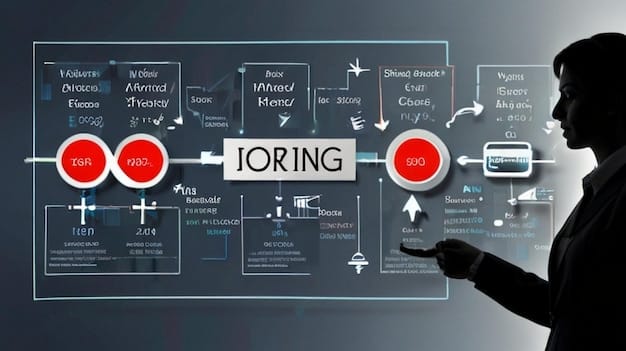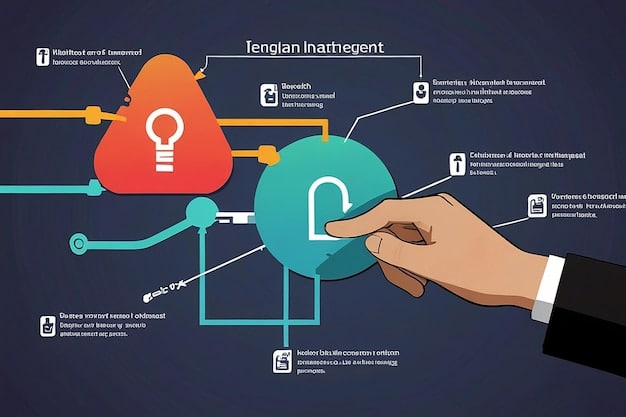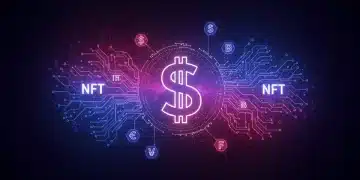Automating Escrow with Smart Contracts: A Step-by-Step Guide for US Businesses

Automating escrow with smart contracts provides a secure, transparent, and efficient method for US businesses to manage transactions by automatically executing terms when predefined conditions are met, reducing reliance on intermediaries.
Are you looking for a more efficient and secure way to manage your business transactions? Explore automating escrow with smart contracts, a step-by-step guide tailored for US businesses to streamline your processes.
Understanding Escrow and Its Traditional Challenges
Escrow is a legal arrangement where a third party holds assets or funds until specific conditions of a contract are fulfilled. Traditionally, this involves significant paperwork, manual verification, and potential delays, creating inefficiencies for businesses.
The Role of a Traditional Escrow Service
Traditional escrow services act as intermediaries, holding funds and releasing them when all parties meet the agreed-upon conditions. This process, while secure, is often slow and expensive.
Challenges Faced by US Businesses Using Traditional Escrow
US businesses encounter several pain points when using traditional escrow, including high fees, bureaucratic processes, and the risk of human error or disputes requiring legal intervention.

- High Costs: Traditional escrow services charge fees that can significantly impact transaction profitability, particularly for smaller businesses.
- Time Delays: The manual verification processes involved can lead to lengthy delays, hindering business agility and responsiveness.
- Potential for Disputes: Disagreements about whether conditions have been met can lead to legal battles, adding further costs and delays.
By understanding these challenges, businesses can better appreciate the advantages offered by automating escrow with smart contracts.
What are Smart Contracts and How Do They Work?
Smart contracts are self-executing contracts written in code and stored on a blockchain. They automatically enforce the terms of an agreement when predefined conditions are met, offering a transparent and immutable process.
Defining Smart Contracts
A smart contract is essentially a digital agreement that lives on a blockchain. Once deployed, it executes automatically when the agreed-upon conditions are satisfied, without the need for intermediaries.
The Mechanics of Smart Contract Execution
Smart contracts operate on a conditional logic basis: “If this, then that.” When the conditions specified in the contract are met, the code automatically executes the agreed-upon actions, such as releasing funds or transferring assets.
- Immutability: Once deployed, smart contracts cannot be altered, ensuring that the terms remain consistent and tamper-proof.
- Transparency: All transactions are recorded on the blockchain, providing a transparent and auditable record for all parties involved.
- Automation: Smart contracts automate the execution of agreements, reducing the need for manual intervention and paperwork.
This automation and transparency make smart contracts a powerful tool for streamlining escrow processes.
The Benefits of Automating Escrow with Smart Contracts
Automating escrow with smart contracts offers numerous advantages for US businesses, including reduced costs, increased efficiency, and enhanced security. By eliminating intermediaries and automating processes, businesses can streamline transactions and improve trust.

Cost Reduction
One of the most significant benefits is the reduction in fees associated with traditional escrow services. Smart contracts eliminate the need for intermediaries, cutting down on transaction costs.
Increased Efficiency
Smart contracts automate the entire escrow process, reducing delays and improving transaction speed. Funds are released automatically when conditions are met, without the need for manual verification.
Enhanced Security and Transparency
The immutable and transparent nature of blockchain technology ensures that all transactions are secure and auditable. This reduces the risk of fraud and enhances trust among parties.
Automating escrow with smart contracts not only saves time and money but also provides a more secure and transparent way to manage transactions.
A Step-by-Step Guide to Implementing Smart Contract Escrow
Implementing smart contract escrow involves several key steps, including defining contract terms, choosing a blockchain platform, writing and deploying the contract, and integrating it into your business processes. Here’s a detailed guide:
Step 1: Define the Contract Terms
Clearly define all the terms and conditions of the escrow agreement. This includes specifying the assets or funds involved, the conditions for release, and any dispute resolution mechanisms.
Step 2: Choose a Blockchain Platform
Select a suitable blockchain platform for deploying your smart contract. Ethereum is a popular choice, but other platforms like Binance Smart Chain and Cardano also offer smart contract capabilities.
Step 3: Write and Deploy the Smart Contract
Develop the smart contract code using a programming language like Solidity (for Ethereum). Ensure the code accurately reflects the agreed-upon terms and conditions. Deploy the contract to the chosen blockchain platform.
- Testing: Thoroughly test the smart contract in a test environment before deploying it to the main network to avoid errors or vulnerabilities.
- Auditing: Consider having the smart contract audited by a third-party security firm to identify and address any potential security issues.
- Gas Optimization: Optimize the contract code to minimize gas fees, which are the transaction costs on the blockchain.
By following these steps, US businesses can successfully implement smart contract escrow and reap the benefits of automation and security.
Legal and Regulatory Considerations for US Businesses
While smart contracts offer many benefits, it’s crucial for US businesses to consider the legal and regulatory landscape. Understanding the legal implications and ensuring compliance is essential for successful implementation.
The Legal Status of Smart Contracts in the US
The legal status of smart contracts is still evolving in the US. While some states have enacted laws recognizing smart contracts, others have yet to address them specifically. Businesses should seek legal advice to ensure compliance with applicable laws.
Compliance with Existing Regulations
Businesses must ensure that their use of smart contracts complies with existing regulations, such as those related to data privacy, consumer protection, and financial transactions. This may involve implementing additional safeguards and controls.
Addressing Potential Legal Challenges
Smart contracts are not immune to legal challenges. Disputes may arise regarding contract interpretation, enforceability, or liability. Businesses should incorporate dispute resolution mechanisms into their smart contracts to address these issues.
Navigating the legal and regulatory landscape is crucial for US businesses seeking to leverage smart contract escrow.
Real-World Use Cases and Examples
Many industries are already leveraging smart contract escrow to streamline transactions and improve trust. Here are some real-world use cases and examples that demonstrate the potential of this technology.
Real Estate Transactions
Smart contracts can automate the escrow process for real estate transactions, ensuring that funds are released only when all conditions, such as inspections and appraisals, are met. This reduces the risk of fraud and speeds up the closing process.
E-commerce
In e-commerce, smart contracts can be used to hold funds in escrow until the buyer receives the goods and confirms their satisfaction. This provides added security for both buyers and sellers, fostering trust and confidence in online transactions.
Freelance Payments
Smart contract escrow can streamline freelance payments, ensuring that freelancers are paid promptly once they complete the agreed-upon work. This reduces the risk of non-payment and improves cash flow for freelancers.
These use cases illustrate the versatility and potential of smart contract escrow across various industries.
| Key Point | Brief Description |
|---|---|
| 🔐 Security | Smart contracts enhance security through blockchain’s immutability and transparency. |
| ⏱️ Efficiency | Automation speeds up transactions by removing manual processes. |
| 💸 Cost | Reduced fees from eliminating traditional escrow intermediaries cut costs. |
| 📜 Legal | Compliance with US regulations is vital for smart contract implementation. |
Frequently Asked Questions
▼
A smart contract is a self-executing contract written in code and stored on a blockchain. It automatically enforces the terms of an agreement when predefined conditions are met.
▼
Smart contracts enhance security due to the immutability and transparency of blockchain technology, reducing the risk of fraud and ensuring all transactions are auditable.
▼
Gas fees are transaction costs on the blockchain, typically associated with executing smart contract code. Optimizing code can help minimize these fees to the lowest possible level, to reduce transaction costs.
▼
Some states have enacted laws that recognize smart contracts. Businesses should seek legal advice to ensure their smart contracts comply with applicable state and federal regulations.
▼
Industries such as real estate, e-commerce, and freelancing can benefit significantly from smart contract escrow by streamlining transactions, reducing costs, and improving trust between parties.
Conclusion
Automating escrow with smart contracts offers a transformative solution for US businesses seeking efficiency, transparency, and security in their transactions. By understanding the technology, legal considerations, and practical implementation steps, businesses can leverage smart contracts to streamline processes and foster trust in an increasingly digital world.





